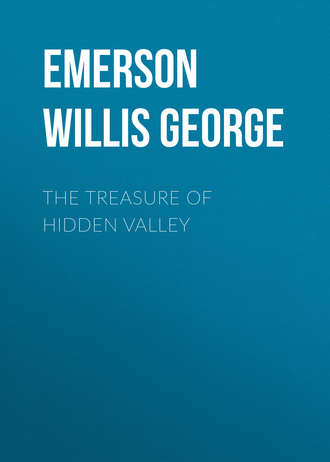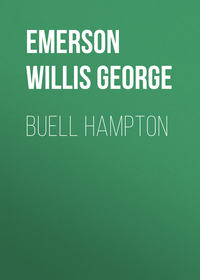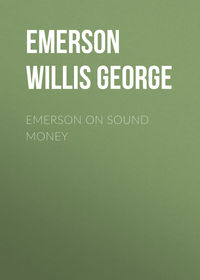 полная версия
полная версияThe Treasure of Hidden Valley
“Yes, but the world requires ‘spenders’ as well as getters,’”laughed Tom Sun. “Otherwise we would all be dying of sheer weariness of each other.”
“Surely, there are arguments on both sides,” assented the Major. “It is a difficult problem. I was merely contending that a community of comparatively poor people who earn their bread by the sweat of their brow – tilling the soil and possessed of high ideals of good citizenship – such people beyond question afford the greatest example of contentment, morality and happiness. Great wealth is the cause of some of our worst types of degeneracy. However,” he concluded, knocking the ashes from his pipe, “it is not my purpose this evening to sermonize. Nor do I intend at present to say anything more about the rich gold discovery I have made except to reiterate my assurance that at the proper time all you gentlemen will be called on to share in the enterprise and in its profits. Now I believe some of you” – and he looked at Jim Rankin, Tom Sun and Boney Earnest as he spoke – “have another engagement tonight. It was only at my special request, Mr. Warfield, that they remained to meet you and Mr. Jones.”
“And we’re much obliged to you, Major,” said Boney Earnest, arising and glancing at his watch. “Hope old John Warfield’s boy and I will get still better acquainted. But I’ve got to be going now. You see my wife insisted that I bring the folks back early so that she might have a visit with Mr. Rankin and Mr. Sun.”
Tom Sun shook hands cordially.
“Glad to have met you, Mr. Warfield,” he said, “for your father’s sake as well as your own. I trust we’ll meet often. Good-night, Mr. Jones.”
Rankin whispered something to Roderick, but Roderick did not catch the words, and when he attempted to inquire the old fellow merely nodded his head and said aloud: “You bet your life; I’m assoomin’ this is jist ‘tween me and you.” Roderick smiled at this oddity, as the man of mystery followed his friends from the room.
When the door closed and Roderick and Grant were alone with the Major, pipes were again lighted, and a spell of silence fell upon the group – the enjoyable silence of quiet companionship. The Major showed no disposition to re-open the subject of the rich gold discovery, nor did Roderick feel inclined to press for further information. As he mused, however, he became more firmly convinced than before that his secret was still his own – that Buell Hampton, in this rugged mountain region with its many undiscovered storehouses of wealth, had tumbled on a different gold-bearing spot to that located by Uncle Allen Miller and his father. Some day, perhaps, he would show the Major the letter and the map. But to do this now might seem like begging the favor of further confidences, so until these were volunteered Roderick must pursue his own lonesome trail. The mere sight of the gold, however, had quickened his pulse beats. To resume the humdrum life at the ranch seemed intolerable. He longed to be out on the hills with his favorite pony Badger, searching every nook and corner for the hidden treasure.
Presently Buell Hampton arose and laid his pipe aside, and going to a curtained corner of the room returned with his violin. And long into the night, with only a fitful light from the burning logs in the open fireplace, the Major played for his young friends. It seemed his repertoire was without beginning and without end. As he played his moods underwent many changes. Now he was gay and happy, at another moment sad and wistful. He passed from sweet low measures into wild, thrilling abandonment. Now he was drawing divine harmony from the strings by dainty caresses, again he was almost brutally compelling them to render forth the fierce passion of music that was surging in his own soul. The performance held the listeners spellbound – left them for the moment speechless when at last the player dropped into a chair. The instrument was laid across his knees; he was still fondling it with gentle touches and taps from his long slender fingers.
“You love your violin, Major,” Roderick at last managed to articulate.
“Yes,” came the low-spoken fervent reply, “every crease, crevice and string of the dear old Cremona that was given me more than half a century ago.”
“I wish,” said Grant, “that I could express my appreciation of the wonderful entertainment you have given us tonight.”
“You are very complimentary,” replied the Major, bestirring himself. He rose, laid the violin on the table, and brightened up the fire with additional fuel.
“But I’m afraid we must be going,” added Grant. “It is getting late.”
“Well, I have a message for you young gentlemen,” said the Major. “You are invited to attend one of the most distinguished soirees ever given in the Platte River Valley. Mr. and Mrs. Shields mentioned this today, and made me the special messenger to extend the invitation to you both.”
“Splendid,” exclaimed Grant. “When does this come off?”
“Two weeks from this evening,” replied the Major. “And we will have a comparative newcomer to the valley to grace the occasion. She has been here through the late fall and winter, but has been too busy nursing her sick and bereaved old father to go out into society.”
“General Holden’s daughter?” queried Grant.
“The same. And Gail Holden is certainly a most beautiful young lady. Have you seen her, Mr. War-field?”
“Not that I’m aware of,” replied Roderick.
“A most noble young woman, too,” continued the Major. “They are Illinois people. The mother died last year under sad circumstances – all the family fortune swept away. But the girl chanced to own these Wyoming acres in her own right, so she brought her father here, and has started a little cattle ranch, going in for pedigreed dairy stock and likely to do well too, make no mistake. You should just see her swing a lariat,” the speaker added with a ring of admiration in his tone.
Roderick started. Great Scott! could this be the fair horsewoman he had encountered on the mountain side just before the coming of the big snow. But a vigorous slap on his shoulder administered by Grant broke him from reverie.
“Why don’t you say something, old fellow? Isn’t this glorious news? Are you not delighted at the opportunity of tripping the light fantastic toe with a beauty from Illinois as well as our own home-grown Wyoming belles?”
“Well,” replied Roderick slowly, “I have not been attending any of these affairs, although I may do so in this instance.”
“Miss Barbara Shields,” said the Major, “especially requested me to tell you, Mr. Warfield, that she positively insists on your being present.”
“Ho, ho!” laughed Grant. “So you’ve made a hit in that quarter, eh, Roderick? Well, better a prospective brother-in-law than a dangerous rival. Dorothy’s mine, and don’t you forget it.”
Grant’s boyish hilarity was contagious, his gay audacity amusing. Even the Major laughed heartily. But Roderick was blushing furiously. A moment before he had been thinking of one fair charmer. And now here was another being thrown at him, so to speak, although in jest and not in earnest. Barbara Shields – he had never dared to think of her as within his reach even had not loyalty bound his affections elsewhere. But the complications seemed certainly to be thickening.
“Come along, old chap,” said Grant, as they gained the roadway. “We’ll have a look through the town, just to see if there’s any news about.”
CHAPTER XIII – ENTANGLEMENTS
THE Bazaar was a popular resort. The proprietor was known as “Southpaw.” Doubtless he had another name but it was not known in the mining camp. Even his bank account was carried in the name of “Southpaw.”
When Roderick and Grant entered the saloon they found a motley crowd at the bar and in the gaming room, fully twenty cowboys with their broad-rimmed sombreros, wearing hairy chaps, decorated with fancy belts and red handkerchiefs carelessly tied about their necks. Evidently one of them had just won at the wheel and they were celebrating.
The brilliant lights and the commingling of half a hundred miners and many cowboys presented a spectacular appearance that was both novel and interesting. Just behind them came shuffling into the room a short, stout, heavily-built man with a scowling face covered with a short growth of black whiskers. His eyes were small and squinty, his forehead low and his chin protruding.
Roderick and Grant were standing at the end of the bar, waiting for lemonades they had ordered. Roderick’s attention was attracted by the uncouth newcomer.
“Grant, who is that gorilla-looking chap?” he asked.
Grant half turned with a sweeping glance and then looking back at Roderick, replied: “That is Bud Bledsoe. He is a sort of sleuth for Grady, the manager of the smelting plant, the man I introduced you to, remember, the first day you came to Encampment.”
“I remember Grady all right,” nodded Roderick.
“Well, many people believe he keeps Bledsoe around him to do his dirty work. A while ago there was a grave suspicion that this chap committed a terrible crime, doubtless inspired by Grady, but it is not known positively and of course Grady is all-powerful and nothing was said about it outright.”
In the meantime Bud Bledsoe walked into the back part of the room, and finding a vacant seat at a gaming table bought a stack of chips and was soon busy over his cards. Presently the two friends, having lighted fresh cigars, left the saloon.
Grant looked into two or three other places, but finding there was “nothing doing,” no news of any kind stirring, at last turned for home. Entering the familiar old bachelor shack, Roderick too felt at home, and it was not long before a cheerful fire was kindled and going. Grant was leaning an elbow on the mantel above and talking to Roderick of the pleasure he anticipated at the coming dance over at the Shields place.
“I wonder what Miss Barbara meant when she sent that special message to you, Roderick? Have you a ground wire of some kind with the young lady and are you on more intimate relations than I have been led to believe?”
Grant smiled broadly at Roderick as he asked the question.
“Search me,” replied Roderick. “I have never spoken to her excepting in the presence of other people.”
“I presume you know,” Grant went on, “that she is the object of Carlisle’s affections and he gets awfully jealous if anyone pays court to her?”
“And who’s Carlisle?” asked Roderick, looking up quickly.
“Oh, he is the great lawyer,” replied Grant “W. Henry Carlisle. Have you never heard of the feud between Carlisle and Attorney Bragdon?”
“No,” said Roderick. “Both names are new to me.”
“Oh, I supposed everybody knew about their forensic battles. You see, W. Henry Carlisle is the attorney for the Smelter and Ben Bragdon is without doubt the most eloquent young lawyer that ever stood before a jury in southern Wyoming. These two fellows are usually against each other in all big lawsuits in these parts of the country, and you should see the courthouse fill up when there is a jury trial.”
Roderick did not seem especially interested, and throwing his cigar stub into the open fire, he filled his pipe. “Now, I’ll have a real smoke,” he observed as he pressed a glowing firestick from the hearth down on the tobacco.
“Grady and Carlisle are together in all financial ventures,” Grant continued.
“Don’t look as if you are very fond of this man Grady,” commented Roderick.
“Fond of him?” ejaculated Grant in disgust; “he is the most obnoxious creature in the district. He treats everybody who is working for him as if they were dogs. He has this bruiser, Bud Bledsoe, as a sort of bodyguard and this W. Henry Carlisle as a legal protector, so he attempts to walk rough shod over everybody – indifferent and insolent. Oh, let’s not talk about Grady. I become indecently indignant whenever I think of his outrages against some of the poor fellows in this camp.”
“All right,” said Roderick, jovially looking up; “let us talk about the dance and especially Miss Dorothy.”
“That’s the text,” said Grant, “Dorothy – Dorothy Shields-Jones. Won’t that make a corker of a name though? If I tell you a secret will you promise it shall be sacred?”
“Certainly,” replied Roderick.
“Well,” said Grant, reddening, “while I was over there at the Dillon Doublejack office, isolated from the world, surrounded with mountains and snow – nothing but snow and snowbanks and high mountains in every direction, why, I played job printer and set up some cards with a name thereon – can’t you guess?”
“Impossible,” said Roderick, smiling broadly.
“Well, Mrs. Dorothy Shields-Jones,” he repeated slowly, then laughed uproariously at the confession.
“Let me see one of the cards,” asked Roderick.
“Oh, no, I only kept the proof I pulled before pieing the type, and that I have since torn up. But just wait That girl’s destiny is marked out for her,” continued Grant, enthusiastically, “and believe me, Warfield, I shall make her life a happy one.”
“Hope you’ve convinced her of that, old man?”
“Convinced her! Why I haven’t had the courage yet to say a word,” replied Grant, somewhat shamefacedly. “I’m going to rely on you to speak up for me when the critical moment arrives.”
“It was rather premature, certainly, to print the lady’s double-barreled-name visiting card,” laughed Roderick. “But there, you know I’m with you and for you all the time.” And he extended the hand of brotherly comradeship.
“And about you and Barbara?” ventured Grant, tentatively. “I’ve heard your name mentioned in connection with hers several times.”
“Oh, forget all that rot,” responded Roderick, flushing slightly. He had never mentioned the “college widow” to his friend, and felt that he was sailing under false colors. “It will be a long time before I can think of such matters,” he went on, turning toward his accustomed stretcher. “Let’s get to bed. It has been a long day, and I for one am tired.”
A few minutes later lights were out.
When they got up next morning, they found that a letter had been pushed under the door. Warfield picked it up and read the scrawled inscription. It was addressed to Grant.
“Gee,” said Grant as he took the letter from Roderick, “this town is forging ahead mighty fast. Free delivery. Who in the demnition bowwows do you suppose could have done this?”
Opening the envelope he spread the letter on the table, and both bent above it to read its contents. There was just a couple of lines, in printed characters.
Words had been cut out of a newspaper apparently, and stuck on the white sheet of paper. They read as follows: “Tell your friend to let Barbara alone or his hide will be shot full of holes.”
Grant and Roderick stood looking at each other, speechless with amazement. Barbara was the only written word.
“What can be the meaning of this?” inquired Roderick.
“Beyond me,” replied Grant. “Evidently others besides myself have come to think you are interested in Barbara Shields. Possibly the young lady has been saying nice things about you, and somebody is jealous.”
“Rank foolishness,” exclaimed Roderick hotly. Then he laughed, as he added: “However, if the young lady interested me before she becomes all the more interesting now. But let the incident drop. We shall see what we shall see.”
They walked up the street to a restaurant and breakfasted.
“It might be,” remarked Grant, referring back to the strange letter, “that Attorney Carlisle, who they say is daffy over Barbara Shields, has had that sleuth of Grady’s, Bud Bledsoe, fix up this letter to sort of scare you off.”
Grant laughed good-humoredly as he said this.
“Scare me off like hell,” said Roderick in disgust. “I am not easily scared with anonymous letters. Only cowards write that sort of stuff.”
They arose from the table and turned down the street towards the smelting plant It was necessary to keep well on the sidewalks and away from the mud in the roadway, for the weather was turning warm and snow was melting very fast.
“There will be no sleighs and sleigh-bells at the Shields’ entertainment,” observed Grant. “This snow in the lowlands will all be gone in a day or two.”
They paused on a street corner and noticed five logging outfits swinging slowly down the street, then turn into the back yard of Buell Hampton’s home and begin unloading.
“What do you suppose Major Hampton can want with all those logs?” asked Grant.
“Let us make a morning call on the Major,” suggested Roderick.
“Right you are,” assented Grant.
The Major extended his usual hearty welcome. He had evidently been busy at his writing table.
“We came down,” said Grant, “to get a job cutting wood.”
The Major looked out of the window at the great stack of logs and smiled. “No, young gentlemen,” he said, “those logs are not for firewood but to build an addition to my humble home. You see, I have a small kitchen curtained off in the rear, and back of that I intend putting in an extra room. I expect to have ample use for this additional accommodation, but just at this time perhaps will not explain its purposes. Won’t you be seated?”
They pulled up chairs before the fire, which was smouldering low, for in the moderated condition of the weather a larger fire was not needed.
“Only for a moment, Major. We do not wish to take you from your work, whatever it may be. I will confess,” Grant went on, smiling, “that we were curious to know about the logs, and decided we would look in on you and satisfy our curiosity; and then, too, we have the pleasure of saying hello.”
“Very kind of you, very kind, I am sure,” responded the Major; and turning to Roderick he inquired when he expected to return to the Shields ranch.
“I am going out this afternoon,” replied Roderick. “By the way, Major, do you expect to be at the Shields’ entertainment?”
“No, it is hardly probable. I am very busy and then, too, I am far past the years when such functions interest. Nevertheless, I can well understand how two young gentlemen like yourselves will thoroughly enjoy an entertainment given by such hospitable people as the Shields.”
Soon after they took their leave and walked up the street. Grant made arrangements to start directly after luncheon for Dillon, where copy had to be got ready for the next issue of his paper.
As Roderick rode slowly across the valley that afternoon, his mind dwelt on the rich gold discovery made by Buell Hampton, and he evolved plans for getting promptly to serious prospecting work on his own account. Sometimes too he caught himself thinking of the strange girl of the hills who could throw a lasso so cleanly and cleverly; he wondered if their paths would ever cross again.
CHAPTER XIV – THE EVENING PARTY
THE night of the big fiesta at the Shields ranch had arrived, and the invited guests had gathered from far and near. And what a bevy of pretty girls and gay young fellows they were! Even the cowboys on this occasion were faultless Beau Brummels; chaps, belts, and other frontier regalia were laid aside in favor of the starched shirtfront and dress clothes of the fashionable East. The entertainment was to consist of dancing and song, with a sumptuous supper about the midnight hour.
Roderick of course was there – “by command” of the fair daughter of the house, Barbara Shields. At the entrance to the reception hall the twin sisters gave him cordial welcome, and gaily rallied him on having at last emerged from his anchorite cell. On passing into the crowded room, young Warfield had one of the greatest surprises of his life.
“Hello, Roderick, old scout, how are you anyway?”
Someone had slapped him on the shoulder, and on turning round he found himself face to face with Whitley Adams.
“Whitley, old man!” he gasped in sheer astonishment.
Then followed hand-shaking such as only two old college chums can engage in after a long separation.
“How did it all happen?” inquired Roderick, when the first flush of meeting was over.
“Tell you later,” said Whitley. “Gee, old man, I ought to beat you up for not letting me know all this time where you were.”
“Well, I have been so confoundedly busy,” was the half-apologetic reply.
“And so have I myself. I am taking a post-graduate course just now in being busy. You would never guess what a man of affairs I’ve come to be.”
“You certainly surprise me,” laughed Roderick drily.
“Oh, but I’m going to take your breath away. Since you’ve gone, I’ve become quite chummy with your Uncle Allen.”
“You don’t say?”
“Yes, siree. I think he took to me first of all in the hope that through me he would get news of the lost prodigal – the son of his adoption whose absence he is never tired of deploring.”
“Poor old uncle,” murmured Roderick, affectionately and regretfully.
“Oh, he takes all the blame to himself for having driven you away from home. But here – let’s get into this quiet corner, man. You haven’t yet heard half my news.”
The two chums were soon installed on a seat conveniently masked – for other purposes, no doubt – by pot plants and flowers.
“And how’s dear Aunt Lois?” asked Roderick, as they settled themselves.
“Oh, dear Aunt Lois can wait,” replied Whitley.
“She’s all right – don’t look a day older since I remember her. It is I who am the topic of importance —I” – and he tapped his chest in the fervency of his egoism.
“Well, fire away,” laughed Roderick.
Whitley rambled on: “Well, I was just going to tell you how your uncle and I have been pulling along together fine. After stopping me in the street two or three times to ask me whether I had yet got news of you, he ended in offering me a position in the bank.”
“Gee whizz!”
“Oh, don’t look so demed superior. Why, man alive. I’m a born banker – a born man of affairs! So at least your uncle tells me in the intervals of asking after you.”
“Yes, you’ve certainly taken my breath away. But how come you to be in Encampment, Whitley?”
“On business, of course – important business, you bet, or I wouldn’t have been spared from the office. Oh, I’ll tell you– you’re a member of the firm, or will be some day, which is all the same thing. There’s a fellow here, W. B. Grady, wanting a big loan on some smelter bonds.”
“I know the man. But I thought he was rolling in money.”
“Oh, it’s just the fellows who are rolling in money who need ready money worst,” smiled the embryonic banker with a shrewd twinkle in his eyes. “He’s a big speculator on the outside, make no mistake, even though he may be a staid and stolid business man here. Well, he needs hard cash just at present, and the proposed loan came the way of our bank. Your uncle jumped at it.”
“Security must be pretty good,” laughed Roderick.
“No doubt. But there’s another reason this time for your uncle’s financial alacrity. Seems an old friend of his was swindled out of the identical block of bonds offered by this same Grady, and your uncle sees a possible chance some day of getting them out of his clutches and restoring them to where they properly belong.”
“But all that’s contrary to one of Uncle Allen’s most cherished principles – that friendship and business don’t mix. I’ve heard him utter that formula a score of times.”
“Well, cherished principles or no cherished principles, he seems downright determined this time to let friendship play a hand. He tells me – oh, I’m quite in his confidence, you see – that it’s a matter of personal pride for him to try and win back his fortune for this old friend, General Holden – that’s the name.”
“Holden? – Holden?” murmured Roderick. He seemed to have heard the name before, but could not for the moment locate its owner.
“Yes, General Holden. He’s ranching up here for the present – or rather his daughter is. They say she’s a stunning girl, and my lawyer friend Ben Bragdon has promised to introduce me. Oh, though I’m a man of affairs, old chap, I’ve an eye for a pretty girl too, all the time. And I’m told she’s a top-notcher in the beauty line, this Gail Holden.”
“Gail Holden!” Roderick repeated the name out loud, as he started erect in his seat. He knew who the father was now – the daughter was no other than the mysterious rider of the range.
Whitley’s face wore a quizzical look.
“Hello! you know her then, old chap?”
“I never met her – at least I have never been introduced to her.”
“That’s good hearing. Then we’ll start level tonight. Of course I’ll cut you out in the long run if she proves to be just my style.”





